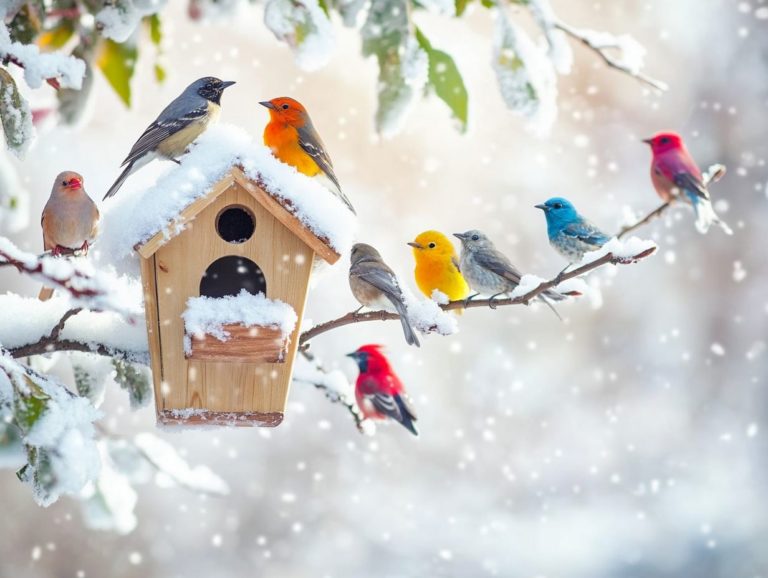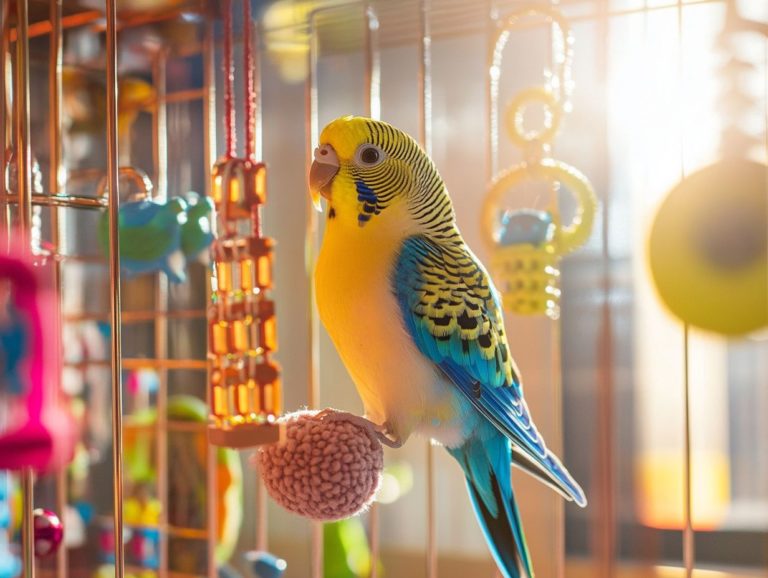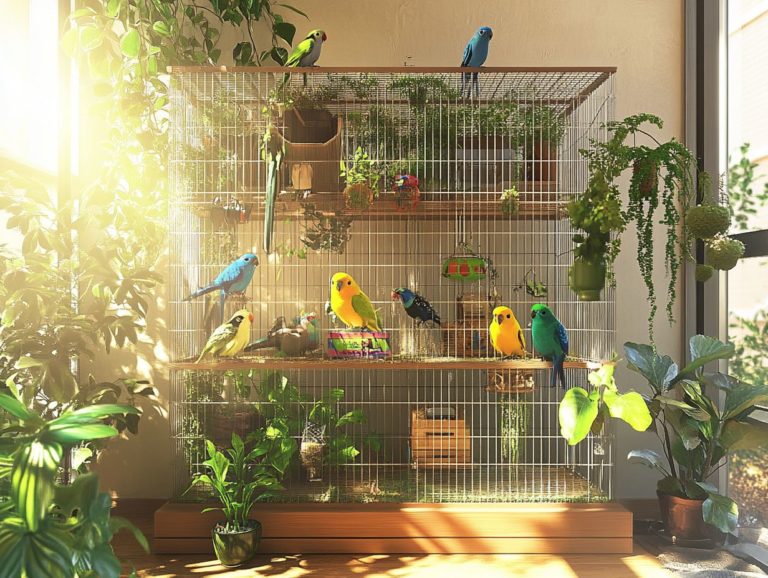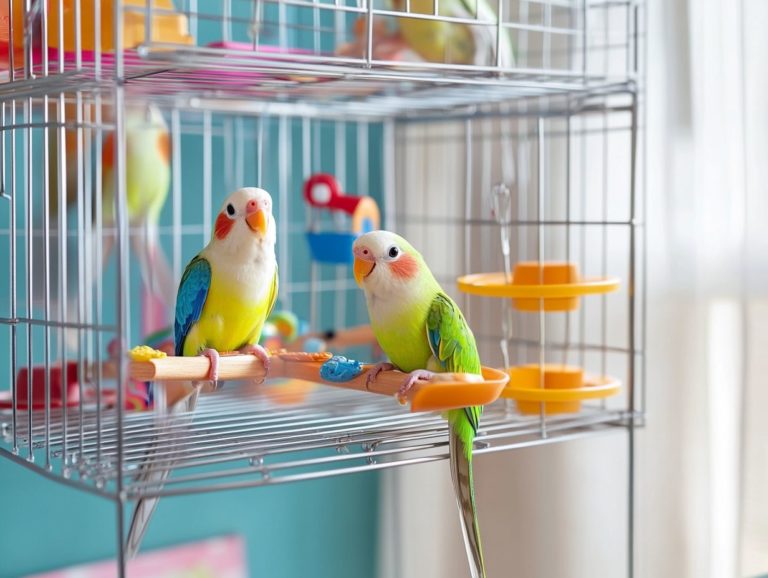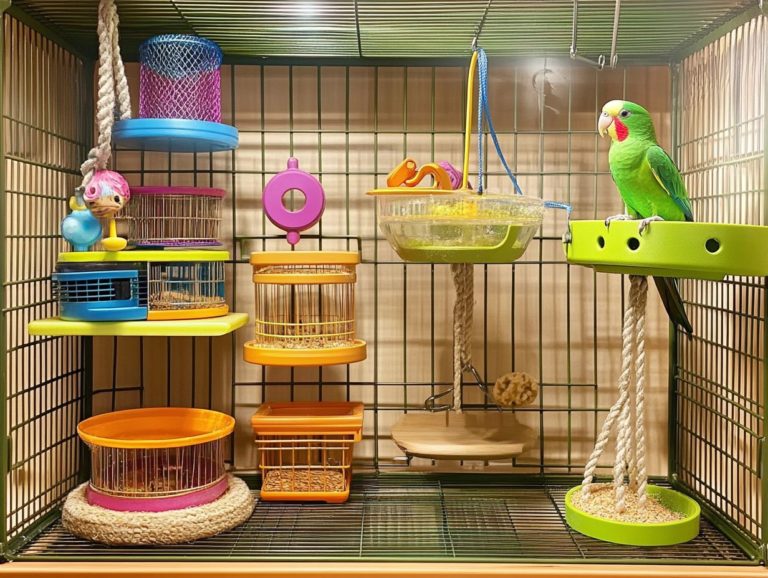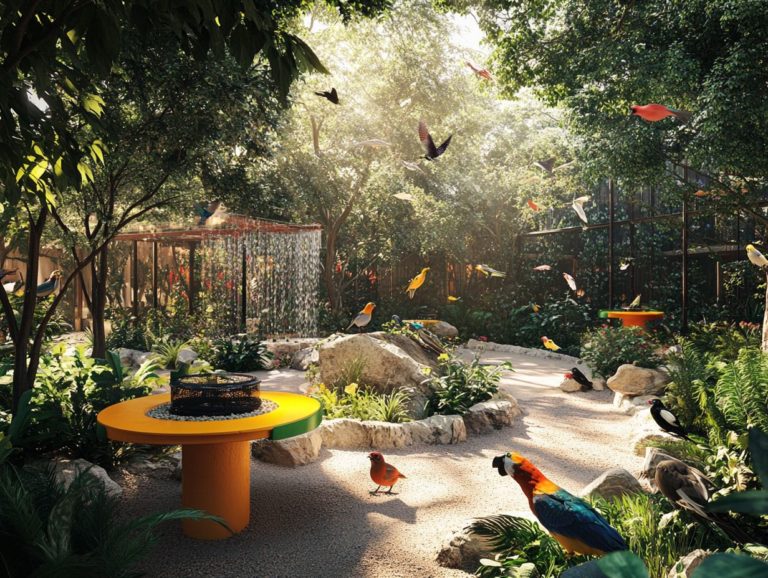Choosing the Right Cage Shape for Your Bird
Picking the right bird cage is crucial for your bird s happiness and health! There are many factors to consider like size, species compatibility, and material to ensure your selection meets their needs.
Get ready to explore exciting cage shapes that are perfect for your bird! This article highlights various cage shapes, including rectangular, round, and octagonal designs, and their unique benefits. You ll also find maintenance tips and guidance to help you choose the best cage for your bird’s lifestyle while matching your personal style.
Dive in and make an informed choice!
Contents
Key Takeaways:
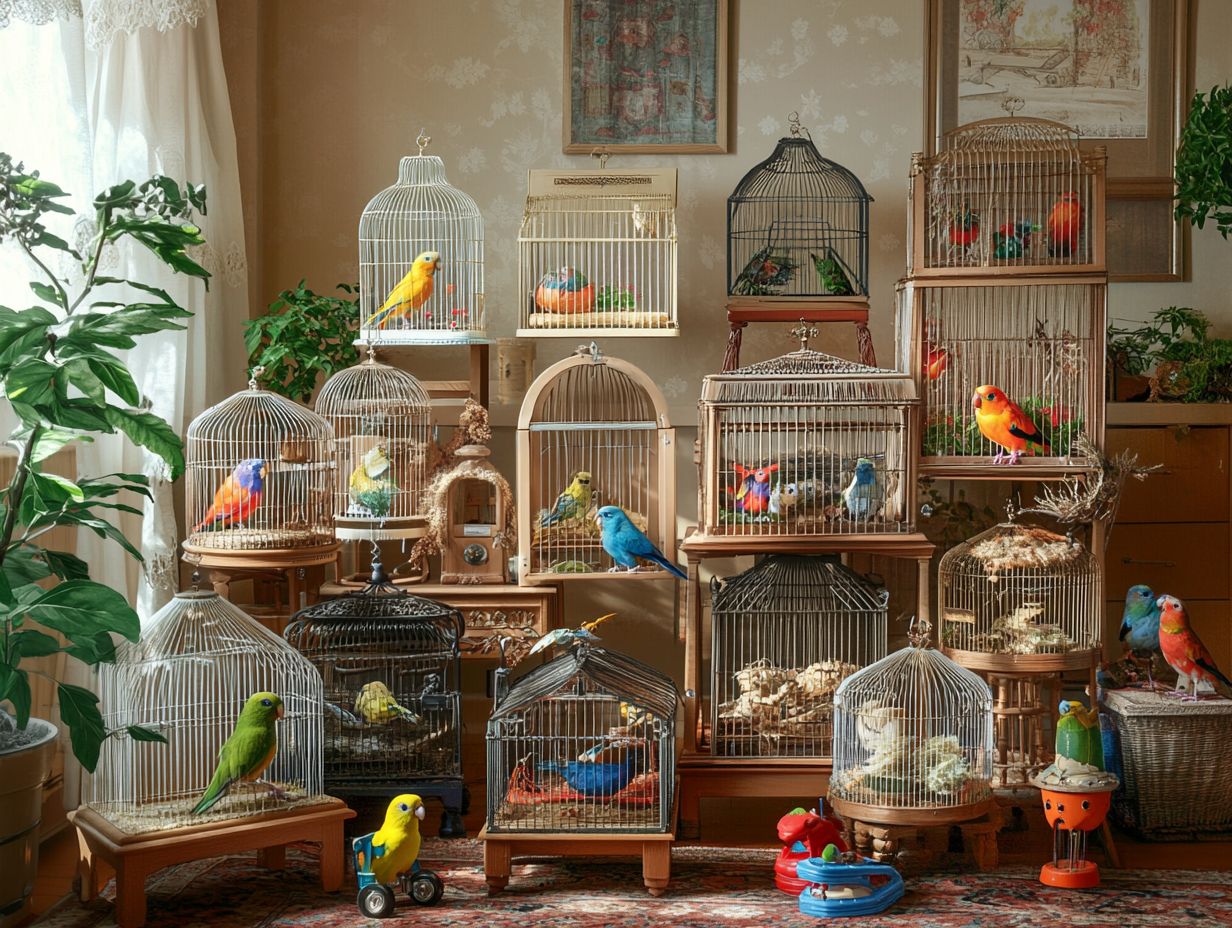
- Act now to ensure your bird gets the perfect cage size and compatibility!
- Rectangular cages provide ample space for movement and activity.
- Match cage shape to your bird’s needs and personal taste for a happy and healthy pet.
Factors to Consider When Choosing a Bird Cage
When selecting a bird cage, there are several critical factors to consider to ensure your bird s well-being and comfort.
It s essential to think about the size of the cage, which should provide plenty of internal living space while accommodating the activity level of your bird species like parrots, canaries, or finches.
The cage design should also complement your bird’s lifestyle. This ensures there s enough room for toys and perches, ultimately promoting your bird’s health and safety.
Size and Species Compatibility
Choosing the right cage size is crucial for the health and happiness of your birds, especially when considering species compatibility and the number of feathered friends you plan to house. For tips on setting up the space, check out this guide on how to arrange your bird’s cage.
The importance of an appropriately sized cage cannot be overstated; each bird species has unique space requirements. For instance, cockatiels generally thrive in a minimum space of 24″ x 24″ x 24″, while energetic conures often need at least 30″ x 30″ x 36″ to thrive. Larger species like macaws and active birds such as Goffins cockatoo ideally require cages measuring at least 36″ x 36″ x 48″.
Providing enough room for flight, play, and social interaction is vital; insufficient space can lead to stress and behavioral problems.
If you have multiple birds, consider their collective activity levels, as cramped quarters can make these challenges worse, jeopardizing their physical and mental health.
Material and Durability
The material of a birdcage is key in determining its durability and safety. Options include stainless steel and powder-coated finishes. Choosing the right material not only ensures that the cage lasts but creates a secure home for your bird companions.
For example, stainless steel offers great benefits like corrosion resistance and easy cleaning, which improves your bird’s health and your peace of mind. On the other hand, cages made from inferior metals or painted finishes may chip or rust, posing risks to your bird’s safety, especially concerning bird health.
Choosing high-quality materials can significantly affect how easily you maintain hygiene a vital factor in creating a healthy environment for your bird friends. This attention to detail enhances the overall quality of life for both your birds and yourself.
Common Cage Shapes and Their Benefits
Different cage shapes—rectangular, round, and octagonal—offer distinct advantages that enhance both the aesthetic appeal of your space and the well-being of your feathered friends. To learn more about selecting the best option, check out this guide on how to choose the right cage for your species.
Rectangular Cages
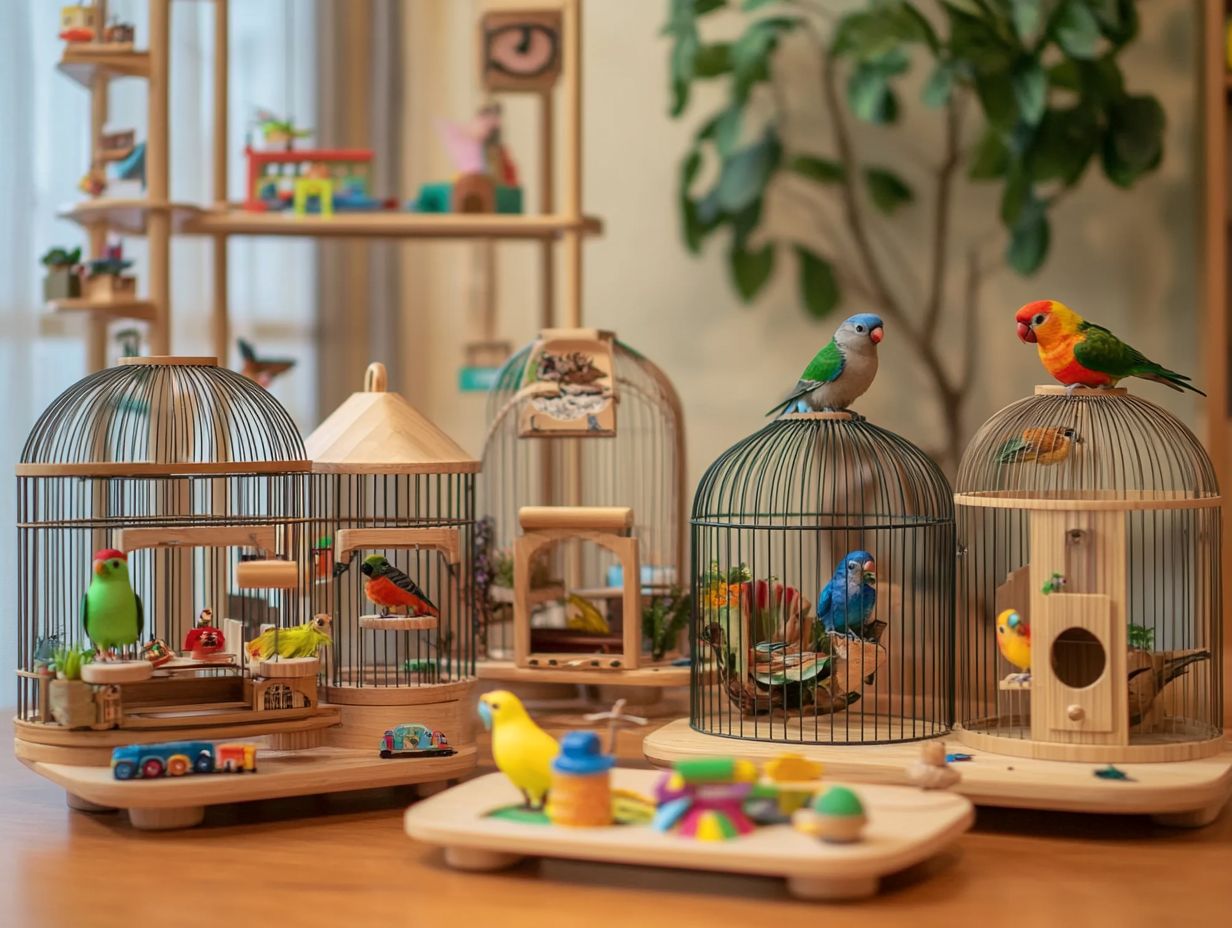
Rectangular cages stand out as a top choice for discerning bird owners. They provide ample internal living space, perfectly suited for a variety of types of birds. When selecting the right option, consider learning how to choose a bird cage with a stand to enhance your pet’s environment.
This generous layout enables you to easily incorporate toys, perches, and food and water dishes. It creates a stimulating environment that actively promotes your birds’ mental well-being.
The design encourages healthy social interactions and facilitates exercise opportunities. This allows your birds to move freely along both width and height.
The rectangular shape enhances safety. The corners provide secure spots for positioning perches and accessories, significantly reducing the risk of accidents.
Species like parakeets, cockatiels, and canaries particularly flourish in these environments. They relish their playtime and social activities while prioritizing their safety.
Round Cages
Round cages are not just unique; they bring a delightful mix of aesthetic appeal and functionality. They are meticulously crafted to enhance both the activity level and overall health of your birds by providing multiple vantage points.
These thoughtfully designed enclosures encourage natural behaviors. They allow your birds to explore, hop, and flit about just like their wild counterparts.
For species such as budgerigars and cockatiels, this design fosters a sense of security and freedom. It enables them to navigate their environment with ease from every angle.
The circular shape minimizes corners where stress might accumulate, ensuring your birds feel less confined. Such spaces promote physical activity, crucial for maintaining their optimal feather condition and preventing obesity. This greatly contributes to their overall well-being.
Octagonal Cages
Octagonal cages offer you a distinctive choice if you’re looking to maximize both space and interaction for your feathered friends. They make them ideal for various bird lifestyles.
These unique structures significantly enhance the living environment for your birds. They foster natural behaviors that are often stifled in traditional rectangular cages, further promoting bird health and activity level.
With more corners and angles, octagonal cages provide multiple perches and play areas. This promotes both physical activity and mental stimulation.
Safety is another key advantage; these cages are often crafted with rounded edges and secure materials, minimizing the risk of injury.
Parakeets, canaries, and even small parrots can truly thrive in these vibrant setups. They revel in the varied space that allows them to explore and engage more fully with their surroundings.
Choosing the Best Cage Shape for Your Bird
Act now! Choosing the right cage for your pet bird is vital for your bird’s happiness and health! It requires careful consideration of your avian companion’s specific needs while also taking into account your own aesthetic preferences as a bird owner.
This balance ensures both functionality and beauty in your bird’s environment.
Matching Cage Shape to Bird’s Needs
Understanding how to match the cage shape to your bird’s specific needs is essential for promoting their well-being and activity levels, and there are several factors to consider when choosing a cage.
For example, larger species like macaws flourish in spacious, wider cages that accommodate their impressive wingspan and need for flight.
On the other hand, smaller birds such as parakeets thrive in taller cages that provide ample climbing opportunities and multiple perches.
These variations in requirements can profoundly affect a bird’s health. A macaw confined to a small cage risks developing weak muscles due to lack of use, while a parakeet in an excessively large space might feel insecure and stressed.
Choosing the right cage shape not only aligns with their natural behaviors but also significantly enhances their quality of life. To further improve their environment, consider how to choose the perfect bird cage accessories, as it encourages a more active and engaged lifestyle.
Personal Preference and Appearance
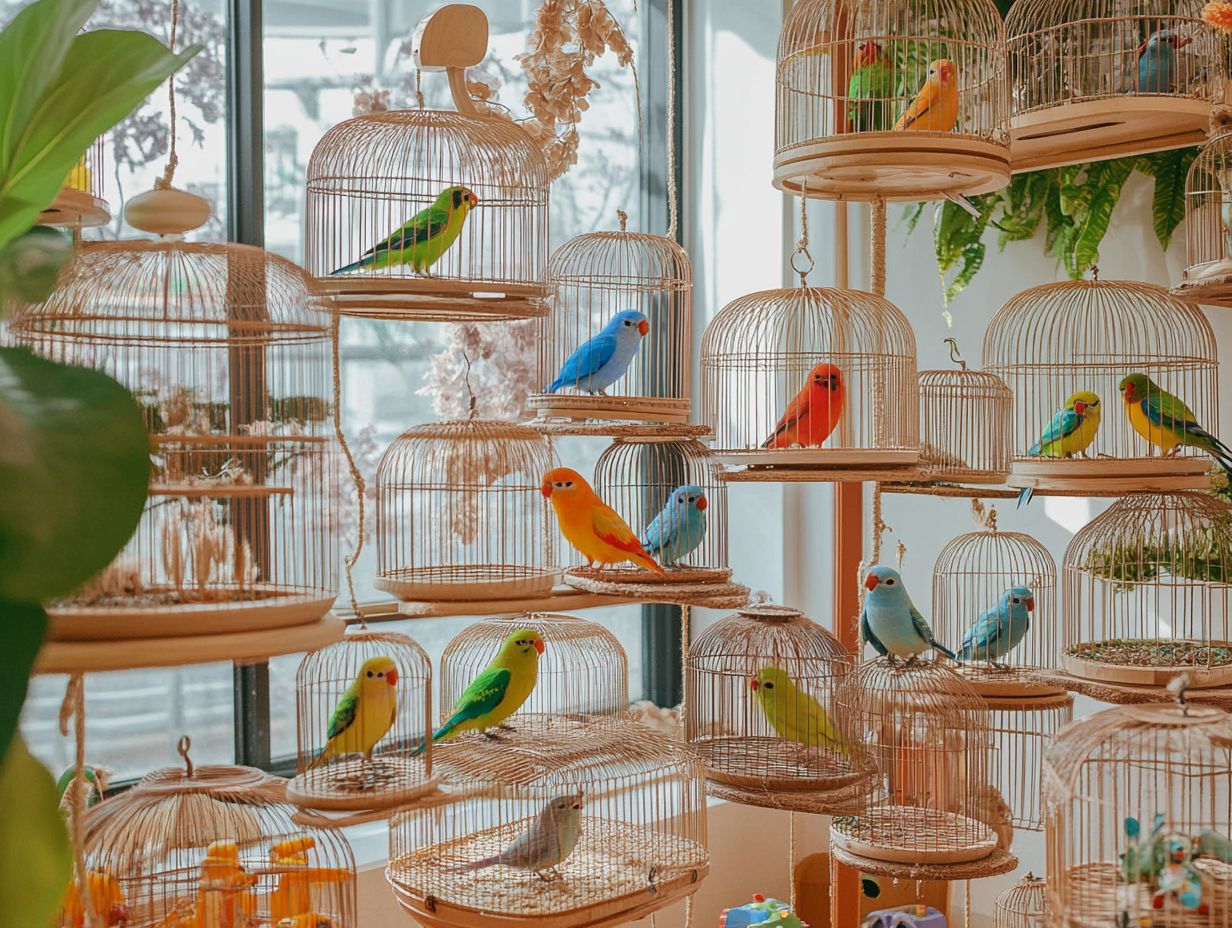
While the functional aspects of a bird cage are crucial, you ll find that appearance and personal preference also play a significant role in your selection process as a bird owner.
The visual appeal of a bird cage can truly transform an ordinary space into a vibrant corner of your home. Your choices in color, shape, and style often reflect your personal tastes. They meet practical needs while enhancing your overall decor and the lifestyle of your bird.
For instance, a sleek, modern cage might fit beautifully in a contemporary setting, while a rustic wooden design could perfectly complement a cozy, traditional home.
Choosing the right design can make your bird thrive! It s important to consider how these aesthetic choices harmonize with your bird’s well-being. Vibrant colors may attract attention, while specific designs could encourage healthier behaviors that promote bird safety.
Therefore, you should achieve a balance between beauty and use to create both an inviting and healthy environment for your feathered companion, enhancing both bird health and happiness.
Maintaining and Cleaning Different Cage Shapes
You must maintain and clean bird cages to ensure your birds health and safety, especially given the variety of cage shapes available, which can impact bird lifestyle.
Taking the time to care for their environment not only contributes to their well-being but also enhances their overall happiness and vitality.
Tips for Proper Cleaning and Maintenance
Ensuring regular cleaning and maintenance of your bird cage is paramount for promoting the health and safety of your feathered companions, no matter the shape or cage material.
A well-maintained environment significantly reduces the risk of illnesses and infections, enhancing the quality of life for your avian friends.
For stainless steel cages, a simple mixture of warm water and mild soap will work wonders to remove grease and stains; just be sure to rinse thoroughly to eliminate any soap residue.
If you have a powder-coated cage, using a soft cloth and a non-abrasive cleaner will keep that protective coating intact and looking sharp.
Proper cleaning not only safeguards your birds health but also creates a thriving environment where they can express their natural behaviors, ultimately reflecting their happiness and well-being.
Frequently Asked Questions
What s the Ideal Cage Shape for My Bird?
The best cage shape for your bird depends on the type and size of your bird. Generally, choosing the right cage involves opting for rectangular or square cages, which are the most suitable for most bird species as they provide ample space for movement and perching.
Can I Use a Round Cage for My Bird?
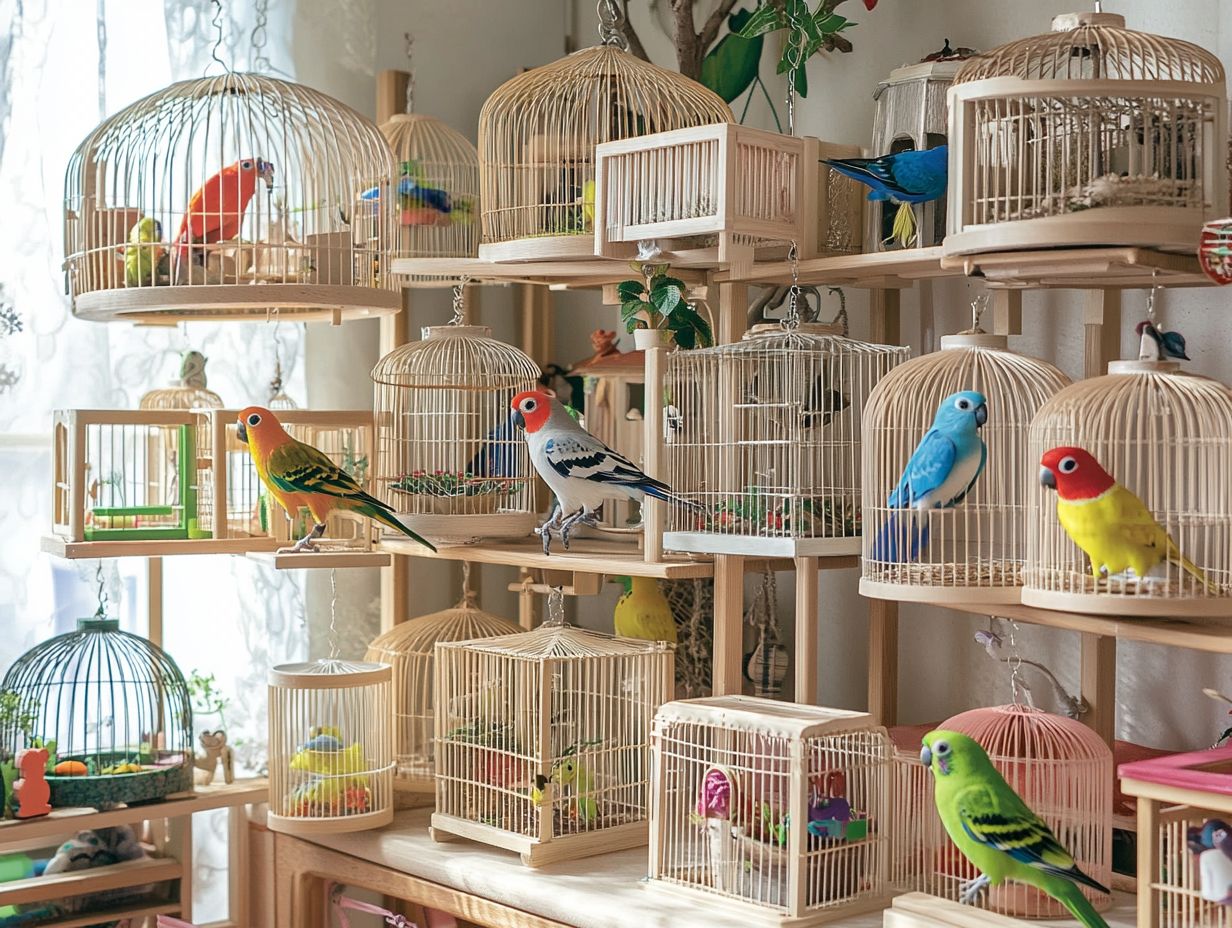
Round cages may look aesthetically pleasing, but they are not recommended for birds. They do not provide enough space for your bird to move and can cause stress and health problems in the long run.
Is a Tall Cage Better Than a Wide One?
It is important to consider your bird’s natural behavior when choosing the right cage for budgies. Tall cages are ideal for birds that like to climb and fly vertically, while wide cages are better for birds that prefer to hop and fly horizontally.
Are There Any Cage Shapes to Avoid?
Avoid cages with sharp edges or corners, as they can be dangerous for your bird. Also, avoid cages with bars that are too wide apart, as your bird may try to squeeze through and get stuck.
Can I Use a Cage with a Domed Top for My Bird?
While domed cages may look unique, they are not the best choice for most birds. The curved shape makes it difficult for your bird to perch and move around comfortably.
What Special Features Should I Look for in a Cage?
When choosing a cage shape, consider factors such as bar spacing, material, and ease of cleaning. It is also beneficial to look for cages with play areas or perches attached to the outside, as they provide additional space for your bird to explore and exercise. Additionally, choosing the right swing for your bird can enhance their playtime experience.
Don’t wait! Explore your options now and create the perfect home for your feathered friend!

